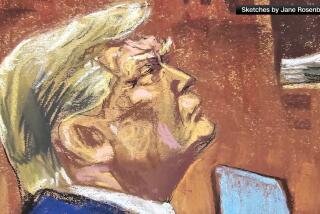Confession Casts Shadow on Rest of Term
- Share via
WASHINGTON — President Clinton’s dramatic admission Monday night that he had an inappropriate relationship with former White House intern Monica S. Lewinsky may deflate efforts to remove him from office, but it could also let much of the remaining air out of his presidency.
With polls showing that most Americans are eager to move beyond the controversy, Clinton’s terse confession and impassioned call for the country to allow him to “reclaim my family life” could increase pressure on both independent counsel Kenneth W. Starr and congressional Republicans to complete the investigation.
But Clinton’s reversal of his earlier denials may also accelerate the natural process of political entropy that traditionally saps the influence of presidents in the later years of second terms. And his surprisingly combative attack on Starr’s investigation promised an escalation of partisan hostilities in the days ahead. On a night when he was expected to sue for peace, Clinton came closer to declaring war.
Perhaps signaling the fireworks to come, a visibly angry Sen. Orrin G. Hatch (R-Utah), chairman of the Senate Judiciary Committee, told CNN Monday night: “I give [Clinton] credit for . . . being willing to take responsibility but . . . I was really offended when he started to attack Ken Starr at the end. Look, Ken Starr isn’t to blame for these actions; [Clinton] is to blame.”
Overall, the speech provided a suitably acrid coda to a darkly historic encounter. In a city that has witnessed many red-letter days, Monday provided a dubious milestone: the first moment visible as a scarlet-letter day.
All the evidence so far suggests that Clinton’s admission will not stampede the public against him. For weeks, most Americans have told pollsters that they believe Clinton had an affair with Lewinsky. Yet his overall job-approval ratings have remained near the highest levels of his presidency and he has continued to draw strong marks for personal attributes such as tenacity, effectiveness and compassion.
“The American people made a judgment on whether or not he had sex with her a long time ago,” said Republican pollster Tony Fabrizio. “There is an understanding that he has to try to protect his marriage [and] his daughter, so they are more than willing to give him the benefit of the doubt from that standpoint.”
Still, no one can say for sure whether that support will hold over time--particularly as television networks endlessly replay the tape of Clinton in January emphatically denying that he had sexual relations with Lewinsky.
Starr’s Intimate Questions an Issue
For most of the last seven months, public outrage has focused less on Clinton’s behavior than on Starr’s perceived excesses in unearthing the alleged liaison. Indeed, reports that Starr on Monday pressed Clinton for the most intimate and humiliating details could deepen public doubts about the prosecutor’s motivation. In his speech Monday, Clinton spent at least as much time attacking the investigation as apologizing for his own behavior.
But with Clinton’s admission, the public focus may shift back at least somewhat toward rendering judgment on his apparent willingness to engage in a sustained workplace affair with a woman less than seven years older than his daughter--in the process endangering a presidency that thousands of supporters had worked to make possible and millions of Americans had entrusted with their votes.
Even for supporters who have watched Clinton careen between triumph and disaster since he announced his presidential candidacy in 1991, the spectacle carried a grim sense of personal tragedy. “I’m saddened more than I am angry,” said Al From, president of the centrist Democratic Leadership Council and one of Clinton’s earliest backers. Inside the White House, one official said that aides were “numb” though “at some point there will be anger” at Clinton.
Conservatives saw Clinton’s concession as a validation of their long-standing complaints about his character and honesty. But even that indignation on the right may not be enough to push the Republican Congress toward serious consideration of impeachment after it receives a final report from Starr, as early as next month.
Some congressional Republicans--such as Rep. Bill McCollum (R-Fla.), chairman of the House Judiciary subcommittee on crime--have said that impeachment proceedings would be warranted even if Clinton’s only offense is perjury for his sworn statement in the Paula Corbin Jones sexual harassment case. Though he denied perjuring himself, Clinton gave that allegation new weight by acknowledging a “not appropriate” relationship with Lewinsky.
But most observers believe that Republicans--as Hatch has repeatedly suggested--would not feel comfortable moving forward on impeachment solely on those grounds, especially if Clinton’s public support remains high and congressional Democrats remain solidly behind him. Unless Starr has compelling evidence that Clinton tried to obstruct justice in the Jones case, the president now may well be able to survive his term.
But survival seems a meager goal for a president who has not only dreamed of realigning American politics but at times has seemed on the brink of doing so. Even if Clinton avoids an impeachment inquiry, he faces an uphill climb to regain the political initiative that he commanded as recently as last January, when he put forward an aggressive 1998 agenda that unified Democrats and placed Republicans on the defensive.
Supporters Tout His Comeback History
Some of those who have watched Clinton recover before from seemingly fatal reversals--from the allegations of an affair with Gennifer Flowers in 1992 to the Republican congressional landslide in 1994--argue that it is premature to consign him to political irrelevance. “Don’t forget in April of 1995, people were questioning his relevance,” From said. “This boy comes back.” His supporters hope that Clinton’s confession will allow him to shift attention back toward policy disputes with the GOP that have been almost entirely eclipsed by the media’s focus on the controversy.
But many others are not sure that Clinton can regain the strength to effectively pressure a conservative congressional majority increasingly confident about rejecting his ideas. “I’m not sure he can revive his presidency after this,” said one former top White House aide still in touch with the president. “In large measure, his presidency is done.”
For Clinton, the cost of the Lewinsky controversy is measured in both lost opportunity and lost credibility. Clinton’s popularity has always depended more on his ideas and empathy than his moral authority in the traditional sense. Even in the days just before his reelection in 1996, 50% of Americans said in a Gallup Poll that they would not describe him as honest.
But Monday’s extraordinary admission could compound doubts about his trustworthiness in ways that corrode his ability to persuade Congress and the country. Even before his confession, the percentage of Americans who described Clinton as honest had fallen in Gallup Polls to about one-third.
“You can lie, but when you squint your eyes and you look in the camera and you point your finger [as Clinton did in his January denial], . . you really raise the stakes,” said independent pollster John Zogby.
That may be true even for congressional Democrats. Though they show no signs of moving away from the president, many remain cautious about embracing him. On Sunday evening and Monday morning, White House officials called top congressional Democrats urging them to advance the argument on Monday that Clinton’s testimony meant the country could finally put the controversy behind it.
But one top congressional aide said that many Democrats were skeptical of identifying with the suggested message, despite assurances from the White House that Starr lacked serious evidence tying Clinton to obstruction of justice in the Jones case. “The White House would like the line of the day to be, ‘It’s over, we can put it behind us,’ ” said the aide. “But we don’t know enough. How can we buy their argument that it’s over when he was telling us for seven months that he didn’t do it?”
Clinton’s larger problem is that the Lewinsky controversy has weakened his hand at a point in his second term when presidents already face a natural erosion of their influence. Despite Clinton’s sky-high approval ratings, Republicans this year had no hesitation about shelving virtually all of his agenda, confident that Clinton could not punish them in November.
That hard line reflects a widespread belief inside the GOP that despite his strong approval ratings, the controversy has undermined Clinton’s ability to move public opinion. After Clinton’s concession Monday, that belief is only likely to solidify--and it will become gospel in the GOP if the party makes gains in the November election.
Social Security Reform Hinges on GOP
Clinton may still be able to make progress next year on Social Security reform if Republicans conclude that it is in their interest to resolve the issue before the presidential election in 2000. But on the rest of his agenda, Clinton’s public disgrace is likely to intensify the already formidable pressure inside the GOP not to “give him any accomplishments to beat his chest with,” noted Fabrizio. At the same time, Clinton’s need to unite Democrats against any possible impeachment effort limits his freedom to make deals with Republicans that anger the left. That dynamic may complicate even Social Security reform.
With those potential costs still to be counted, the controversy already has left a long list of losers. Judging by the polls, Starr has become one of the most disliked men in America--and his turbulent investigation may precipitate a major retrenchment of the independent counsel law. After seven months of salacious detail and feverish speculation, the media has seen its ethics and credibility sharply questioned.
And now Clinton faces not only the derailment of his policy agenda but a public humiliation as acute as any president has ever suffered. In this collision of sex, law and politics, no one will walk away entirely unharmed.
More to Read
Get the L.A. Times Politics newsletter
Deeply reported insights into legislation, politics and policy from Sacramento, Washington and beyond. In your inbox twice per week.
You may occasionally receive promotional content from the Los Angeles Times.










